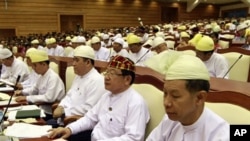Burma’s parliament held its opening session Monday, without Aung San Suu Kyi and 42 of her newly elected colleagues from the National League for Democracy.
The main opposition party campaigned on pledges to amend the country’s constitution. They are now holding up their participation in government over objections to the oath that all parliament members swear at the opening of each legislative session.
NLD party spokesperson Nyan Win and Aung San Suu Kyi herself have insisted they do not intend to boycott the parliamentary session, and that they believe the objection to the wording of the oath is an issue they can solve quickly.
They say they want the oath changed to say parliamentarians will "respect" rather than "safeguard" the constitution, which was drafted by the former military government.
U Thein Nyunt, former NLD member, political prisoner, and founder of the New National Democracy Party, has been a member of parliament since he was elected in 2010. He said he is saddened not to be joined by other members of the opposition in parliament on Monday.
He said he expected to see the NLD leaders with whom he has worked since 1990, and also some young leaders who have very good prospects to do good work for the country, but it did not happen.
Thein Nyunt said he worries the NLD decision could harm voter confidence.
Visiting fellow at Australia National University Trevor Wilson pointed out that the NLD had previously objected to the wording of the oath as it appeared in the election law, which was changed by the government and the parliament so that the NLD could participate in the by-election.
"The NLD is being perfectly consistent in what they're saying, but they don't seem to have acknowledged that there is a legal process that has to be negotiated with the parliament about changing the oath of office as there would be with any parliament," Wilson said.
Wilson suggested that the NLD might have to take a more conciliatory approach, to build a coalition in parliament that can pass reforms.
President Thein Sein told reporters in Tokyo Monday that he does not intend to change the constitutional oath, but he is still committed to the country’s ongoing political reforms.
Aung Thaung, a member of the USDP, the ruling government party, is one of the chief negotiators in talks aimed at ending conflicts with armed ethnic groups in border areas. Many ethnic groups see Aung San Suu Kyi as key to resolving the long-running conflicts.
Aung Thaung says the government will continue with peace talks with ethnic groups - with or without the NLD leader.
Leaders of the National League for Democracy say they are hopeful the standoff over the oath can be resolved within 10 days.
Sanctions on Burma
United States
|
Europe
|
Australia
|
Canada
|
Japan
|




